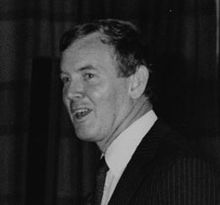The Lord Moore of Lower Marsh | |
|---|---|
 Moore in 1985 | |
| Secretary of State for Social Security | |
| In office 25 July 1988 – 23 July 1989 | |
| Prime Minister | Margaret Thatcher |
| Preceded by | Himself (Social Services) |
| Succeeded by | Tony Newton |
| Secretary of State for Social Services | |
| In office 13 June 1987 – 25 July 1988 | |
| Prime Minister | Margaret Thatcher |
| Preceded by | Norman Fowler |
| Succeeded by | Himself (Social Security) Kenneth Clarke (Health) |
| Secretary of State for Transport | |
| In office 21 May 1986 – 13 June 1987 | |
| Prime Minister | Margaret Thatcher |
| Preceded by | Nicholas Ridley |
| Succeeded by | Paul Channon |
| Financial Secretary to the Treasury | |
| In office 19 October 1983 – 21 May 1986 | |
| Prime Minister | Margaret Thatcher |
| Preceded by | Nicholas Ridley |
| Succeeded by | Norman Lamont |
| Economic Secretary to the Treasury | |
| In office 13 June 1983 – 19 October 1983 | |
| Prime Minister | Margaret Thatcher |
| Preceded by | Jock Bruce-Gardyne |
| Succeeded by | Ian Stewart |
| Member of the House of Lords Lord Temporal | |
| In office 3 July 1992 – 20 May 2019 Life Peerage | |
| Member of Parliament for Croydon Central | |
| In office 28 February 1974 – 16 March 1992 | |
| Preceded by | Constituency created |
| Succeeded by | Paul Beresford |
| Personal details | |
| Born | John Edward Michael Moore 26 November 1937 London, England |
| Died | 20 May 2019 (aged 81) London, England |
| Political party | Conservative |
| Spouse |
Sheila Tillotson
(m. 1962; died 2008) |
| Children | 3 |
| Alma mater | London School of Economics |
| Profession | Stockbroker |
John Edward Michael Moore, Baron Moore of Lower Marsh, PC (26 November 1937 – 20 May 2019) was a British Conservative Party politician who was Member of Parliament for Croydon Central from February 1974 until 1992. During the Premiership of Margaret Thatcher he enjoyed a meteoric rise through the ranks of government, which culminated in his serving as a Secretary of State in the Cabinet from 1987 to 1989. For a time, he was considered a rising star of his party and a potential leadership contender.
Moore was particularly noted for his "filmstar good looks" and an American background: Moore's wife was American and he had lived for several years in the US. He brought aspects of American corporate culture to government and was reported to speak with a slight American accent. His first political experience was as a Democratic Party organiser in Illinois during the early 1960s.
Moore's fortunes in government waned after 1987 when he was made responsible for the highly sensitive portfolios of health and social security. His earlier success had been as a facilitator of the Thatcher government's privatisation programme. In this capacity he became known as "Mr Privatisation". When Moore attempted to extend this concept into the management of the National Health Service and the wider provision of social services, he encountered opposition from all sides. After losing credibility he was effectively demoted in 1988 (through loss of the health portfolio) and then sacked from his cabinet post in 1989.
Moore left the House of Commons in 1992, subsequently holding a number of corporate directorships and chairmanships.